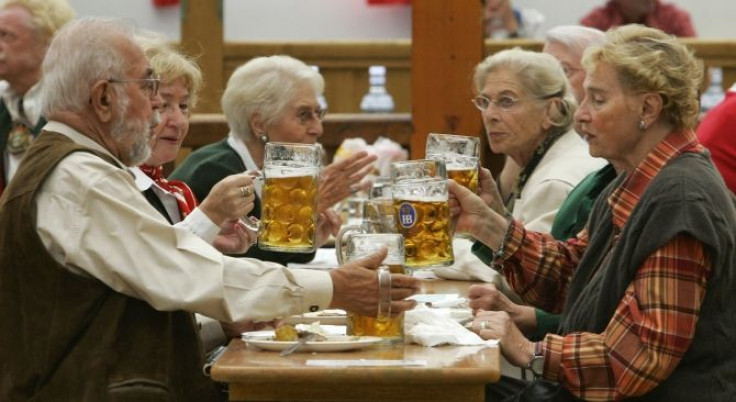Binge Drinking Affects Brain Functioning in Elderly

Binge Drinking can raise risk of cognitive and memory decline in elderly, says a new study.
Researchers worked on a nationally representative survey of U.S. adults and found that binge drinking once or twice a month significantly increased risk of cognitive decline in senior citizens.
"We know binge drinking can be harmful: it can increase the risk of harm to the cardiovascular system, including the chance of developing heart disease; and it is related to an increased risk of both intentional and unintentional injuries. However, until we conducted our study it was not clear what the effect was of binge drinking on cognitive function and the risk of developing dementia," said lead author of the study, Dr. Ian Lang from the Peninsula College of Medicine & Dentistry (PCMD).
The study included more than 5,000 participants aged 65 and older in the Health and Retirement Study. The first set of data was collected in 2002. Participants were followed for around 8 years during which cognitive ability tests were conducted over the phone.
Consumption of more than four drinks on a single occasion was considered binge drinking.
Researchers found that men were more likely to report binge drinking (8 percent once a month) than women (1.5 percent).
The research analysis showed that people who reported binge drinking once a month had a 62 percent higher chance of experiencing a cognitive decline and a 27 percent higher chance of experiencing a memory decline.
People who reported binge drinking twice a month were two and a half times more likely to be in the group of people who were experiencing a ten percent cognitive and memory decline.
"In our group of community-dwelling older adults, binge drinking is associated with an increased risk of cognitive decline. That’s a real worry because there’s a proven link between cognitive decline and risk of dementia. Those who reported binge drinking at least twice a month were more than twice as likely to have higher levels of decline in both cognitive function and memory. These differences were present even when we took into account other factors known to be related to cognitive decline such as age and level of education," said Dr. Lang.
Medical Daily had earlier reported that alcohol affects cognitive functions both positively and negatively. Earlier studies have shown that moderate drinking in old age improves quality of life and that people who indulge in occasional binge drinking have no serious health risks. One research has even shown how drinking alcohol can improve one's problem solving ability.
Researchers in the present study say that binge drinking is not just a problem associated with teenagers.
"This research has a number of implications. First, older people – and their doctors – should be aware that binge drinking may increase their risk of experiencing cognitive decline and encouraged to change their drinking behaviours accordingly. Second, policymakers and public health specialists should know that binge drinking is not just a problem among adolescents and younger adults. We have to start thinking about older people when we are planning interventions to reduce binge drinking," Dr. Lang added.
The findings will be presented at the Alzheimer's Association International Conference 2012.



























